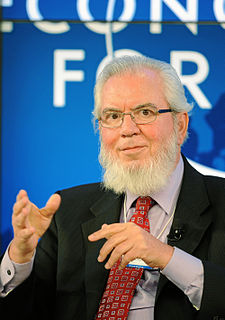A Quote by Ludwig von Mises
The characteristic mark of this age of dictators, wars and revolutions is its anticapitalistic bias. Most governments and political parties were eager to restrict the sphere of private initiative and free enterprise.
Related Quotes
The corporate State considers that private enterprise in the sphere of production is the most effective and useful instrument in the interest of the nation. In view of the fact that private organisation of production is a function of national concern, the organiser of the enterprise is responsible to the State for the direction given to production.
The quickest and surest way to production, prosperity, and economic growth is through private enterprise. The best way for governments to encourage private enterprise is to establish justice, to enforce contracts, to insure domestic peace and tranquility, to protect private property, and to secure the blessings of liberty including economic liberty - which means to stop putting obstacles in the way of private enterprise.
There is one view of the subject which ought to have its influence on those who espouse doctrines which strike at the authoritative origin and efficacious operation of the Government of the United States. The Government of the U.S. like all Governments free in their principles, rests on compact; a compact, not between the Government & the parties who formed & live under it; but among the parties themselves, and the strongest of Governments are those in which the compacts were most fairly formed and most faithfully executed.
Americans live under the delusion that enterprise here is both private and free. It may be nominally private, but it's anything but free. Unfortunately, most people don't know what freedom is. So they are unfazed when they hear that before you can do anything of a commercial nature, you need government permission.
In the political, the social, the economic, even the cultural sphere, the revolutions of our time have been revolutions "against" rather than revolutions "for"... On the whole throughout this period the man--or party--that stood for doing the positive has usually cut a pathetic figure; well meaning but ineffectual, civilized but unrealistic, he was suspect alike to [by both] the ultras of destruction and the ultras of preservation and restoration.
We know that dictators are quick to choose aggression, while free nations strive to resolve differences in peace. We know that oppressive governments support terror, while free governments fight the terrorists in their midst. We know that free peoples embrace progress and life, instead of becoming the recruits for murderous ideologies.
Conservatives came to office to reduce the size of government and enlarge the sphere of free and private initiative. But lately we have increased government in order to stay in office. And, soon, if we don't remember why we were elected we will have lost our office along with our principles, and leave a mountain of debt that our children's grandchildren will suffer from long after we have departed this earth. Because, my friends, hypocrisy is the most obvious of sins, and the people will punish it.



































